Are Florida Marriage License Records Available to the Public?
Yes. Florida marriage license records are available to the public, and interested members can access them through the court clerk’s office.
 Written by Background Check Repair
Written by Background Check Repair
Background Checks | June 19, 2024
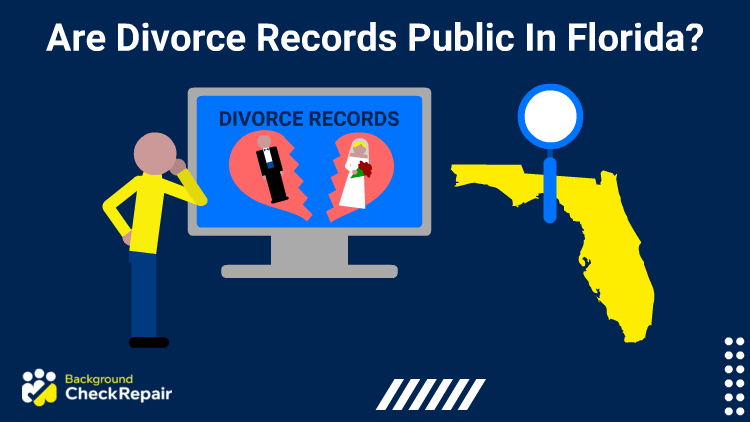
Table of Contents
Are divorce records public in Florida? Divorce records are part of court records which are public documents that the general population can access, but this can depend on the state.
Though the documents are often available to the public, the court may seal some information.
This guide will answer the question, are divorce records public in Florida? And explain the process of obtaining these records.
Fortunately, it can be easy to find FL divorces by simply using a free name-based background check service, right now.
However, if the records required aren’t easily searched, the following information outlines the steps involved in learning about divorce records public in Florida, and where to find those records.
Public records refer to documents, information, or records created by government agencies or officers that are maintained or kept according to the law. Government agencies or offices are responsible for filing these records and providing public access.
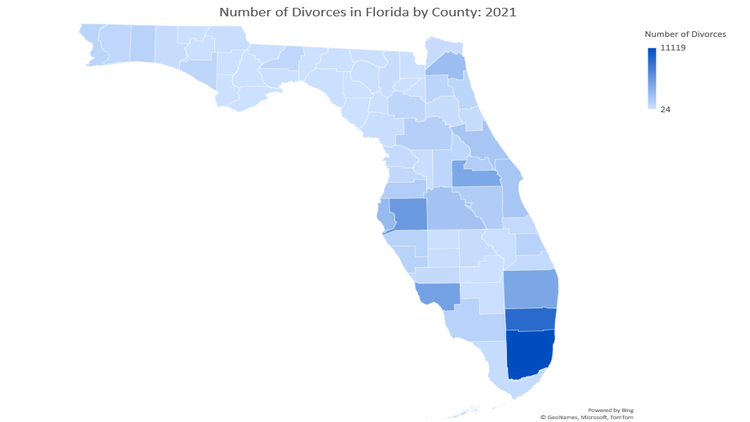
Residents can access several public records for free at the county, state, city, and federal levels. Examples of public records that are free include:
It is well to note that even though these records are free, in most cases, obtaining them is challenging as they are primarily available at a local government agency.
In 2021, an average of 1115 divorces were recorded across the state of Florida. Below is a table listing the recorded number of divorces in each county.
It seems that from beginning to end, the rights of passage in a person’s life are part of public records. Vital records include:
Hospitals and professionals responsible for a child’s birth always report the deliveries. Coroner offices are the ones responsible for assigning death certificates. These two vital records help with census data as well as other statistics needed by the government.
Moreover, these records help prevent states from having records of unidentified residents.
Marriage licenses are also public records and help when someone is looking into their family history or tracking past family members. The local county clerk’s office is responsible for managing and making the four vital records available: death, birth, divorce, and marriage. Additionally, older vital records are often available in the health departments found in every state.
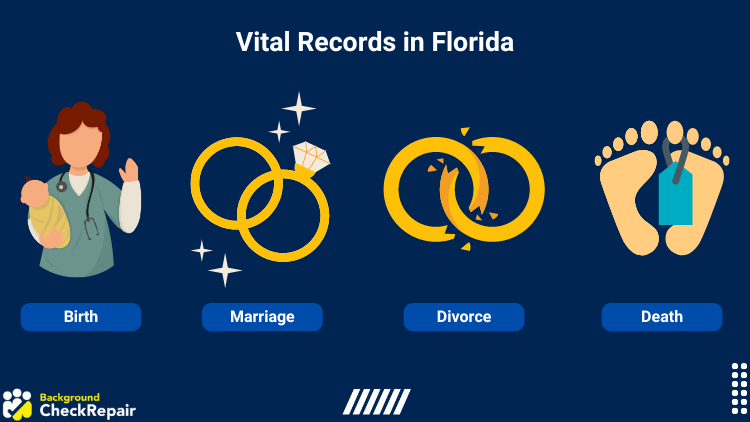
Besides physical locations, most states have included online databases to promote easy access.
A marriage contract is a legally binding document between two parties that enter matrimony knowingly. These contracts highlight the duties and obligations of the two parties to each other and any possible future children. Courts document marriage contracts in several ways.
In Florida, the Department of Health is responsible for making these documents available either by mail or in person.1
While marriage license records are part of vital records and should be available to the public, they are among some of the most difficult information to obtain. This difficulty results from the personal nature of these records. Most government organizations choose to give out marriage verification letters instead of original marriage licenses and records.
The organizations are required to maintain the state of the original marriage record with regard to the parties involved in the marriage. These records are critical when changes need to be made.
Are divorce records public in Florida? Divorce and marriage records are part of family court records which include personal information of the parties involved. Therefore, the documents need to be maintained in their original state should anyone want to make changes. As a result, these two records, though public, are difficult to locate or obtain and may not be available through government resources or third-party websites.
In general, members of the public cannot access complete marriage records freely. The Clerk of Circuit Court maintains marriage certificates from June 6th, 1927, to the present. The interested party should visit the Department of Health Vital Statistics Office to access this information.
The record provided will not be complete. It will contain only general information that includes:
This certificate proves that marriage has indeed occurred. Information on marriages that occurred before June 6th, 1927, can be found in the office of the Circuit Court Clerk in the county where the marriage occurred.4
The Bureau of Vital Statistics offers mail-in and walk-in services for members of the public who are interested in obtaining a marriage certificate. The interested party should complete the marriage certificate application form and submit it to the Florida Bureau of Vital Statistics.6
The Fees include:
‘Dissolution of marriage’ is a term used to describe divorce in Florida. Dissolution of marriage is covered under family law. The public can access family court records in person through the local county clerk’s office or online.
However, some records of the divorce may be kept private due to particular circumstances.
Florida is among the numerous states in the US that have fault as a ground for marriage dissolution. To dissolve a marriage, one of the parties involved should prove that the marriage has been ‘irretrievable broken.2 Both parties have the right to file for dissolution of marriage. For marriage to get dissolved, the interested party must:
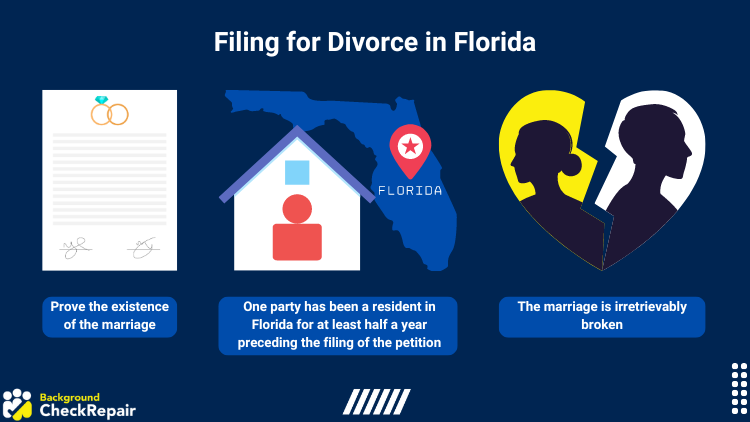
The judge will consider the reason for the irretrievable breakdown of the marriage under specific limited circumstances when determining equitable distribution of marital debts and assets and developing a parenting plan.
Since each case is unique, the outcomes of divorce proceedings differ on a case-by-case basis. These outcomes include but are not limited to:
A collaborative dissolution process is always available to parties that want to dissolve their marriage amicably with professional assistance. Collaborative dissolution is a voluntary process for dispute resolution that starts at any time before or after the dissolution of marriage petition has been filed.
The spouses and their attorneys will sign collaborative participation agreements explaining the matter’s scope and nature. Additionally, the parties involved will have to disclose material and relevant information voluntarily and use good faith efforts to negotiate.
A collaborative dissolution process aims to get both parties into a written settlement agreement that covers all factors, which include but are not limited to:
If the collaborative process is not successful in part or whole, both parties will discharge their attorneys and proceed to contest the dissolution in court.
To file for a dissolution of marriage in a Florida court, the concerned party can use two ways, either ‘Regular’ or ‘Simplified’ dissolution of marriage.
The process of regular dissolution starts when a spouse files a petition for dissolution of marriage with the circuit court. The court where the petition is filed should be in the jurisdiction where either spouse resides.
The spouse filing the petition should allege that their marriage is irretrievably broken. In this petition, the spouse will set out what they want from the court. Once the other spouse is served, they must address the matters in the petition for dissolution and file an answer in the next 20 days.
The recipient of the dissolution petition is free to raise additional issues that they want the court to address as well as file a counter-petition.
There are several steps needed when undertaking regular dissolution of marriage. They include:
Automatic Financial Disclosure: Each party must hand out certain financial information and complete a financial affidavit to the other party. Financial information must be disclosed a few days before any temporary hearing or within 45 days of the service petition. If a spouse fails to provide this information, the court may dismiss the case or refuse to consider that spouse’s requests.
The parties and court can modify the financial requirements except for the financial affidavit. This is mandatory for cases that seek financial relief.
Mediation: This process helps the spouses work out a suitable arrangement or agreement without trial or a protracted process. Mediation is not used to reconcile spouses; instead, it’s used to help the parties arrive at an agreeable term.
Formalizing settlement terms: Once the parties have agreed on all or some of the issues, they sign a written agreement which is then presented to the court. If the parties come to an understanding of their own, they will create terms that they are more likely to comply with rather than having the terms set by a judge.
Contested Final Hearing: In some cases, spouses do not agree on any or some of the issues and will require a final hearing or trial. Each party will present testimony and evidence to the judge, who will decide on the matters the parties have contested.
A simplified dissolution process occurs without the services of attorneys. However, the spouses are required to file all the necessary documents correctly and appear before a judge who will grant the final dissolution.
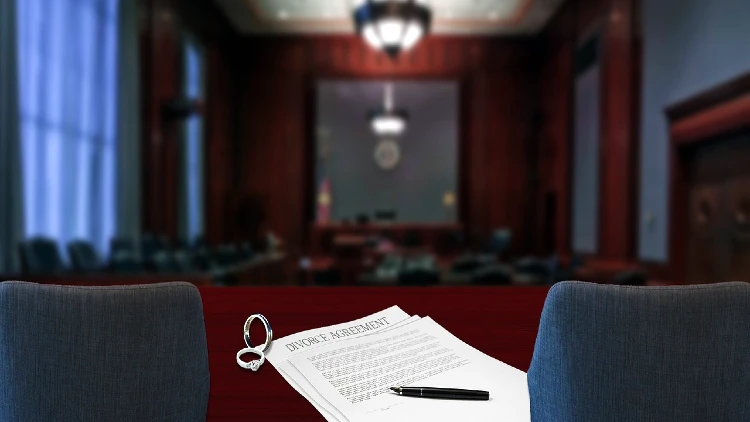
(Image: Christine Fuller9)
There are several requirements needed for couples to be eligible for final dissolution. They include:
If one or both spouses do not meet these requirements, they must undergo the regular dissolution process.
The best way to prevent public access to a divorce record is to have it sealed by the court. To seal a record, the interested party should prove that a public divorce record could damage their:
The judge puts the following factors into consideration before sealing a person’s divorce record:
Even if a person’s divorce record is not sealed, sensitive information will not be made available to the public. This information includes:
The most difficult and complex process in a divorce or dissolution of marriage is the division of debts and assets. Assets include but are not limited to:
Debts or liabilities include:
In Florida, debts and assets are divided into marital and non-marital. If the parties involved acquired any debt or asset during a marriage, then it’s marital and subject to distribution. On the other hand, the court will award non-marital assets to only one party.
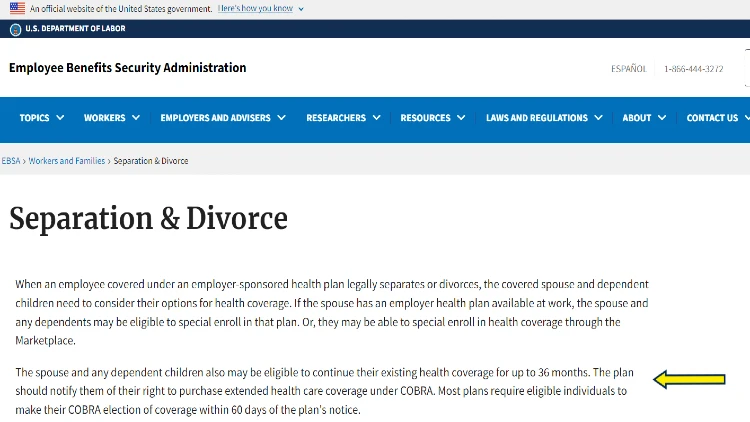
The U.S. Department of Labor outlines employee benefits for spouses and children in the event of a divorce or separation.
Equitable distribution of marital debts and assets is provided for under the Florida statutes.3 The court will first start with the presumption that there is an equal division of marital assets and debts. The court will then divide the marital estate in an equitable and fair manner (not necessarily equal).
The equitable distribution of marital estate comes before considering alimony. Several factors that affect this distribution include but are not limited to:
In most cases, the assets are divided during a trial because many spouses fail to find reasonable agreements during mediation.
Once the court completes the equitable distribution of marital assets, the judge will consider who to award alimony. This could go to the wife or the husband. For a judge to award alimony, two conditions must be met. First, the spouse requesting alimony should demonstrate a need for it. Second, the requester should also demonstrate that the other party has the ability to pay.
Once these two conditions are met, the court will consider all relevant factors and determine the amount of alimony that should be awarded. The types of alimony that the court awards include:
Bridge-the-gap alimony: This is awarded to a spouse transitioning from marriage to being single. This alimony helps the spouse adjust to their new status and meet any identifiable short-term needs. This award has a limited time and is only given under certain conditions.
Rehabilitative alimony: The recipient of this alimony is given the opportunity to establish their ability to self-support. The recipient will either redevelop previous credentials or skills or acquire training, education, or work experience needed to get appropriate employment credentials or skills. This alimony comes with a specific rehabilitative plan highlighting the expectations placed on the alimony recipient.4
Durational alimony: the court awards durational alimony when periodic or permanent alimony is inappropriate. In this case, the recipient will receive alimony for a set period after marriage dissolution.
Permanent alimony: The court awards this alimony to account for necessities and life needs that were established during the marriage. The recipient lacks the financial ability to meet these necessities and needs following the dissolution of marriage.
When awarding alimony, courts consider the following factors:
Each spouse is required to support their children financially. Child support could be either through indirect benefits like insurance payments for dental and medical expenses or mortgage payments. In some cases, child support involves direct payments, and the obligation for support ends once the child has reached age 18, is emancipated, marries, dies, or joins the armed forces.
Divorce certificates are the easiest to find in Florida,7 although they provide very little information. This information will include:
Most people request a divorce certificate when they want to enter a new marriage or change their names. They need proof that the marriage ended.
For a more detailed report, the party should seek to obtain a divorce record which will contain information found on a divorce certificate and a divorce decree. A divorce record is more extensive and will include the general information of the case, such as testimonies, evidence, and judgment.
Wondering how to conduct a free online search for divorce records in Florida? The best way to access divorce records online in Florida is to visit the Circuit Court Clerk’s website. The Florida courts provide access to all Circuit Courts in Florida.
To get to the Family Court Records, the party should navigate the access page in one of the circuit courts in Florida.8 Next, the party will fill out the registration form, then log in to the records portal and begin their search in family law cases.
The interested party can also ask for these records in the circuit clerk’s office in person or by mail. In some counties, the clerk’s office allows the requests to be made by fax or over the phone. The most effective way is to visit the Circuit Court Clerk’s office in the county where the case was held to obtain accurate results.
The addresses of these offices are available online on the courts’ websites. Other available information also includes email address, fax number, and phone number.
The Clerks of Court offices are responsible for maintaining court records and providing access to these records. Are Divorce records public in Florida? Yes, these records can be easily obtained in the circuit clerk’s office.

(Image: Birgit Böllinger10)
The requester will be charged search and copy fees when requesting for the record; therefore, they will need either a debit or a credit card when they visit the clerk’s office. In the request form provided, the party should include
All documents involving the dissolution of marriage in Florida that were recorded after June 1927 are part of the records found in the office of the Circuit Court Clerk in the county where the divorce occurred. A requester can also obtain divorce documents through the Bureau of Vital Statistics.
| Where Do I Find Florida (county) Vital Records and Marriage Locations | Location |
| Where Do I Find Escambia, Okaloosa, Walton, and Santa Rosa Vital Records and Marriage Records? | First Circuit |
| Where Do I Find Gadsden, Franklin, Leon, Jefferson, Wakulla, Liberty Vital Records and Marriage Records? | Second Circuit |
| Where Do I Find Dixie, Columbia, Lafayette, Hamilton, Taylor, Madison, Suwanee Vital Records and Marriage Records? | Third Circuit |
| Where Do I Find Clay, Nassau, And Duval Vital Records and Marriage Records? | Fourth Circuit |
| Where Do I Find Hernando, Citrus, Marion, Lake, and Sumter Vital Records and Marriage Records? | Fifth Circuit |
| Where Do I Find Pinellas and Pasco Vital Records and Marriage Records? | Sixth Circuit |
| Where Do I Find Flagler, Putnam, Volusia, and St Johns Vital Records and Marriage Records? | Seventh Circuit |
| Where Do I Find Baker, Alachua, Bradford, Levy, Union, and Gilchrist Vital Records and Marriage Records? | Eighth Circuit |
| Where Do I Find Osceola and Orange Vital Records and Marriage Records? | Ninth Circuit |
| Where Do I Find Highlands, Polk, and Hardee Vital Records and Marriage Records? | 10th Circuit |
| Where Do I Find Miami-Dade Vital Records and Marriage Records? | 11th Circuit |
| Where Do I Find Manatee, Desoto, And Sarasota Vital Records and Marriage Records? | 12th Circuit |
| Where Do I Find Hillsborough Vital Records and Marriage Records? | 13th Circuit |
| Where Do I Find Washington, Gulf, Bay, Holmes, and Jackson Vital Records and Marriage Records? | 14th Circuit |
| Where Do I Find Palm Beach Vital Records and Marriage Records? | 15th Circuit |
| Where Do I Find Monroe Vital Records and Marriage Records? | 16th Circuit |
| Where Do I Find Broward Vital Records and Marriage Records? | 17th Circuit |
| Where Do I Find Brevard and Seminole Vital Records and Marriage Records? | 18th Circuit |
| Where Do I Find Martin, Indian River, Okeechobee, and St Lucie Vital Records and Marriage Records? | 19th Circuit |
| Where Do I Find Collier, Charlotte, Glades, Lee, and Hendry Vital Records and Marriage Records? | 20th Circuit |
| Florida Circuits | District Court Locations |
| 1st, 2nd, 3rd, 4th, 8th, and 14th Circuits (First District) | First District Court of Appeal |
| 6th, 10th, 12th, 13th, and 20th Circuits (Second District) | Second District Court of Appeal |
| 11th and 16th Circuits (Third District) | Third District Court of Appeal |
| 15th, 17th, and 19th Circuits (Fourth District) | Fourth District Court of Appeal |
| 5th, 7th, 9th, and 18th Circuits (Fifth District) | Fifth District Court of Appeal |
| State of Florida Supreme Court | Supreme Court of Florida |
| Where Do I Find Public Records in (City) Florida? | Where Do I Find Online Records in (City) Florida? |
| Where Do I Find Public Records in Jacksonville, Florida? Duval County Circuit Court | Where Do I Find Online Records in Jacksonville, Florida? County Clerk Duval |
| Where Do I Find Public Records in Miami, Florida? Clerk of the Courts Miami-Dade | Where Do I Find Online Records in Miami, Florida? Miami-Dade County Clerk |
| Where Do I Find Public Records in Tampa Florida? Department of Public Affairs Tampa | Where Do I Find Online Records in Tampa Florida Public Records Tampa |
| Where Do I Find Public Records in Orlando, Florida? Department of Public Affairs City of Orlando | Where Do I Find Online Records in Orlando, Florida? Department of Public Affairs City of Orlando |
| Where Do I Find Public Records in St. Petersburg, Florida? St. Petersburg Public Records | Where Do I Find Online Records in St. Petersburg, Florida? St. Petersburg Public Records |
| Where Do I Find Public Records in Hialeah, Florida? Public Records Hialeah | Where Do I Find Online Records in Hialeah, Florida? City Clerk’s Office Hialeah |
| Where Do I Find Criminal Records In (County)? | Location |
| Where Do I Find Criminal Records in Escambia? | Escambia County Sheriff’s Office |
| Where Do I Find Criminal Records in Okaloosa? | Okaloosa County Sherriff’s Office |
| Where Do I Find Criminal Records in Walton? | Walton County Sheriff’s Office |
| Where Do I Find Criminal Records in Santa Rosa? | Santa Rosa County Sheriff’s Office |
| Where Do I Find Criminal Records in Gadsden? | Gadsden county |
| Where Do I Find Criminal Records in Jefferson? | Jefferson county |
| Where Do I Find Criminal Records in Leon? | Leon county |
| Where Do I Find Criminal Records in Liberty? | Liberty county |
| Where Do I Find Criminal Records in Wakulla? | Wakulla County |
| Where Do I Find Criminal Records in Gilchrist? | Gilchrist County |
| Where Do I Find Criminal Records in Lafayette? | Lafayette County |
| Where Do I Find Criminal Records in Levy? | Levy County |
| Where Do I Find Criminal Records in Taylor? | Taylor County |
| Where Do I Find Criminal Records in Suwannee? | Suwannee County |
| Where Do I Find Criminal Records in Alachua? | Alachua County |
| Where Do I Find Criminal Records in Columbia? | Columbia County |
| Where Do I Find Criminal Records in Union? | Union County |
| Where Do I Find Criminal Records in Clay? | Clay County Sheriff’s Office |
| Where Do I Find Criminal Records in Nassau? | Nassau County Sheriff’s Office |
| Where Do I Find Criminal Records in Duval? | Duval County Sheriff’s Office |
| Where Do I Find Criminal Records in Hernando? | Hernando County Sheriff’s Office |
| Where Do I Find Criminal Records in Citrus? | Citrus County Sheriff’s Office |
| Where Do I Find Criminal Records in Marion? | Marion County Sheriff’s Office |
| Where Do I Find Criminal Records in Lake? | Florida Courts |
| Where Do I Find Criminal Records in Sumter? | Sumter Board County Commissioners |
| Where Do I Find Criminal Records in Pinellas? | Pinellas County Florida |
| Where Do I Find Criminal Records in Pasco? | Pasco County Sheriff’s Office |
| Where Do I Find Criminal Records in Flagler? | Flagler County Sheriff’s Office |
| Where Do I Find Criminal Records in Volusia? | Volusia County Sheriff’s Office |
| Where Do I Find Criminal Records in St John? | St John County Sheriff’s Office |
| Where Do I Find Criminal Records in Baker? | Baker County Clerk Court |
| Where Do I Find Criminal Records in Alachua? | Alachua County Sheriff’s Office |
| Where Do I Find Criminal Records in Bradford? | Bradford County |
| Where Do I Find Criminal Records in Osceola? | Osceola County Sheriff’s Office |
| Where Do I Find Criminal Records in Orange? | Orange County Government |
| Where Do I Find Criminal Records in Highland? | Highland County clerk |
| Where Do I Find Criminal Records in Polk? | Polk County Sheriff’s Office |
| Where Do I Find Criminal Records in Hardee? | Hardee County Public Records |
| Where Do I Find Criminal Records in Miami-Dade? | Miami-Dade County |
| Where Do I Find Criminal Records in Manatee? | Manatee County Sheriff’s Office |
| Where Do I Find Criminal Records in Desoto? | Desoto County Sheriff’s |
| Where Do I Find Criminal Records in Sarasota? | Sarasota County Sheriff’s Office |
| Where Do I Find Criminal Records in Hillsborough? | Hillsborough Criminal Records |
| Where Do I Find Criminal Records in Washington? | Washington County Public Records |
| Where Do I Find Criminal Records in Gulf? | Gulf County Public Records |
| Where Do I Find Criminal Records in Bay? | Bay County Public Records |
| Where Do I Find Criminal Records in Holmes? | Holmes County Criminal records |
| Where Do I Find Criminal Records in Jackson? | Jackson County Criminal Records |
| Where Do I Find Criminal Records in Palm Beach? | Palm Beach County Sheriff’s Office |
| Where Do I Find Criminal Records in Monroe? | Monroe County Public Records |
| Where Do I Find Criminal Records in Broward? | Broward County Sheriff’s Office |
| Where Do I Find Criminal Records in Brevard? | Brevard County Sheriff’s Office |
| Where Do I Find Criminal Records in Seminole? | Seminole County Sheriff’s Office |
| Where Do I Find Criminal Records in Martin? | Martin County Sheriff’s Office |
| Where Do I Find Criminal Records in Indian River? | Indian River Sheriff’s Office |
| Where Do I Find Criminal Records in Okeechobee? | Okeechobee County Public Records |
| Where Do I Find Criminal Records in Lucie? | St Lucie County Sheriff’s Office |
| Where Do I Find Criminal Records in Collier? | Collier County Public Records |
| Where Do I Find Criminal Records in Charlotte? | Charlotte County Sheriff’s Office |
| Where Do I Find Criminal Records in Glades? | Glades County Public Records |
| Where Do I Find Criminal Records in Lee? | Lee County Sheriff’s Office |
| Where Do I Find Criminal Records in Hendry? | Hendry County Sheriff’s Office |
| Where Do I Find Florida (county) Public Records? | Where Do I Find Florida (county) Deed and Real Property Records? |
| Where Do I Find Escambia, Okaloosa, Walton, and Santa Rosa Public Records? First Circuit Court Clerk | Where Do I Find Escambia, Okaloosa, Walton, and Santa Rosa Deed and Real Property Records? First Circuit Court Clerk |
| Where Do I Find Gadsden, Franklin, Leon, Jefferson, Wakulla, and Liberty Public Records? Second Circuit Court Clerk | Where Do I Find Gadsden, Franklin, Leon, Jefferson, Wakulla, and Liberty Deed and Real Property Records? Second Circuit Court Clerk |
| Where Do I Find Dixie, Columbia, Lafayette, Hamilton, Taylor, Madison, and Suwanee Public Records? Third Circuit Court Clerk | Where Do I Find Dixie, Columbia, Lafayette, Hamilton, Taylor, Madison, and Suwanee Deed and Real Property Records? Third Circuit Court Clerk |
| Where Do I Find Clay, Nassau, and Duval Public Records? Fourth Circuit Court Clerk | Where Do I Find Clay, Nassau, and Duval Deed and Real Property Records? Fourth Circuit Court Clerk |
| Where Do I Find Hernando, Citrus, Marion, Lake, and Sumter Public Records? Fifth Circuit Court Clerk | Where Do I Find Hernando, Citrus, Marion, Lake, and Sumter Deed and Real Property Records? Fifth Circuit Court Clerk |
| Where Do I Find Pinellas and Pasco Public Records? Sixth Circuit Court Clerk | Where Do I Find Pinellas and Pasco Deed and Real Property Records? Sixth Circuit Court Clerk |
| Where Do I Find Flagler, Volusia, and St Johns Public Records? Seventh Circuit Court Clerk | Where Do I Find Flagler, Putnam, Volusia, and St Johns Deed and Real Property Records? Seventh Circuit Court Clerk |
| Where Do I Find Baker, Alachua, Bradford, Levy, Union, and Gilchrist Criminal Records? Eighth Circuit Court Clerk | Where Do I Find Baker, Alachua, Bradford, Levy, Union, and Gilchrist Deed and Real Property Records? Eighth Circuit Court Clerk |
| Where Do I Find Osceola and Orange Criminal Records? Ninth Circuit Court Clerk | Where Do I Find Osceola and Orange Deed and Real Property Records? Ninth Circuit Court Clerk |
| Where Do I Find Highlands, Polk, and Hardee Criminal Records? 10th Circuit Court Clerk | Where Do I Find Highlands, Polk, and Hardee Deed and Real Property Records? 10th Circuit Court Clerk |
| Where Do I Find Miami-Dade Criminal Records? 11th Circuit Court Clerk | Where Do I Find Miami-Dade Deed and Real Property Records? 11th Circuit Court Clerk |
| Where Do I Find Manatee, Desoto, And Sarasota Criminal Records? 12th Circuit Court Clerk | Where Do I Find Manatee, Desoto, And Sarasota Deed and Real Property Records? 12th Circuit Court Clerk |
| Where Do I Find Hillsborough Criminal Records? 13th Circuit Court Clerk | Where Do I Find Hillsborough Deed and Real Property Records? 13th Circuit Court Clerk |
| Where Do I Find Washington, Gulf, Bay, Holmes, and Jackson Criminal Records? 14th Circuit Court Clerk | Where Do I Find Washington, Gulf, Bay, Holmes, and Jackson Deed and Real Property Records? 14th Circuit Court Clerk |
| Where Do I Find Palm Beach Criminal Records? 15th Circuit Court Clerk | Where Do I Find Palm Beach Deed and Real Property Records? 15th Circuit Court Clerk |
| Where Do I Find Monroe Criminal Records? 16th Circuit Court Clerk | Where Do I Find Monroe Deed and Real Property Records? 16th Circuit Court Clerk |
| Where Do I Find Broward Criminal Records? 17th Circuit Court Clerk | Where Do I Find Broward Deed and Real Property Records? 17th Circuit Court Clerk |
| Where Do I Find Brevard and Seminole Criminal Records? 18th Circuit Court Clerk | Where Do I Find Brevard and Seminole Deed and Real Property Records? 18th Circuit Court Clerk |
| Where Do I Find Martin, Indian River, Okeechobee, and St Lucie Criminal Records? 19th Circuit Court Clerk | Where Do I Find Martin, Indian River, Okeechobee, and St Lucie Deed and Real Property Records? 19th Circuit Court Clerk |
| Where Do I Find Collier, Charlotte, Glades, Lee, and Hendry Criminal Records? 20th Circuit Court Clerk | Where Do I Find Collier, Charlotte, Glades, Lee, and Hendry Deed and Real Property Records? 20th Circuit Court Clerk |
The dissolution of marriage or divorce documents in Florida that range from June 1927 to the present can be obtained through the Circuit Court Clerk in the county where the divorce occurred. Additionally, this information can be gathered through the bureau of vital statistics.
So, are divorce records public in Florida, yes, you just need to know where to look.
Yes. Florida marriage license records are available to the public, and interested members can access them through the court clerk’s office.
You can order a divorce record from the Bureau of Vital Statistics or obtain the record in person or by mail through the office of the court clerk.
The best place to get public divorce records in Florida is through the office of the Circuit Court Clerk or the Bureau of Vital Statistics.
You will start by filing a petition for dissolution of marriage in the circuit court. You must prove that the marriage is irretrievably broken and that you or your spouse has lived in Florida for the last six months.
Yes. Those who are living outside Florida can access divorce records through third party websites or by mail.
Spouses will have to sign a marriage agreement either mutual or presented by a judge, that looks into parenting plan, child support, and custody.
You can visit the office of the Court Clerk to access court records and search names by name.
1Consumer Pamphlet, Divorce in Florida. (April 2019). The Florida Bar. Retrieved on August 13th, 2022, From <https://www.floridabar.org/public/consumer/pamphlet010/>
2Vital Records, Nd. California Department of Public Health. Retrieved on August 13th, 2020 From <https://www.cdph.ca.gov/Programs/CHSI/Pages/Divorce-Mail.aspx>
3How To Find Divorce Records. (January 2022). News Now. Retrieved on August 13th, 2022 from <https://www.wfxg.com/story/43222742/how-to-find-divorce-records>
4Owenby, L. (May 2021). Are Divorce Records Public In Florida? Owenby Law P. A. Retrieved on August 13th, 2022 From <https://www.owenbylaw.com/blog/2021/may/are-divorce-records-public-in-florida-/>
5Flclerks. (2022). Circuit Court Clerk. Florida Court Clerks & Comptrollers. Retrieved 10 10, 2022, from <https://www.flclerks.com/>
6Florida Department of Health. (2022). Marriage Certificate Application Form. Florida Health. Retrieved 10 10, 2022, from <http://www.floridahealth.gov/certificates/certificates/_documents/dh261-application-marriage-2016.pdf>
7Florida Department of Health in Desoto. (2015, 07 22). Divorce Certificates. Florida Health. Retrieved 10 10, 2022, from <https://desoto.floridahealth.gov/certificates/divorce/index.html>
8Trial Courts Circuit in Florida. (2022, June 28). Trial Courts – Circuit. Florida Courts. Retrieved 10 10, 2022, from <https://www.flcourts.org/Florida-Courts/Trial-Courts-Circuit>
9Photo by Christine Fuller. Cropped, Resized, Changed Format. Pixabay. Retrieved June 19, 2024, from <https://pixabay.com/photos/divorce-agreement-courtroom-wedding-3194994/>
10Photo by Birgit Böllinger. Cropped, Resized, Changed Format. Pixabay. Retrieved June 19, 2024, from <https://pixabay.com/photos/files-files-shelf-paper-office-4440841/>
We use cookies to ensure that we give you the best experience on our website. If you continue to use this site we will assume that you are happy with it